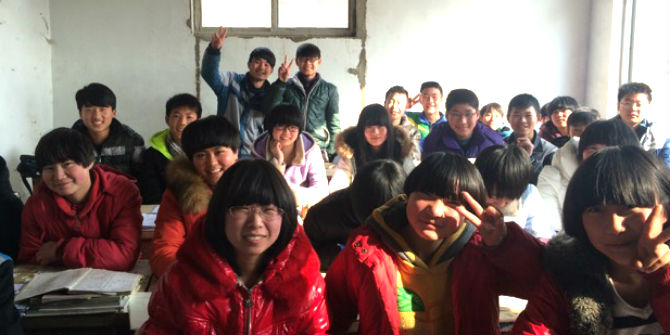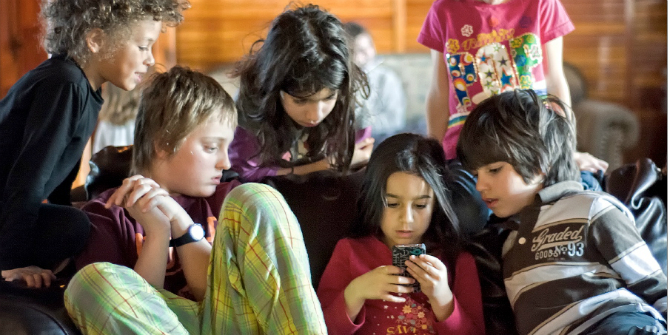Ever more media choices, face-to-face versus digital communication and parent-child conflicts: Andreas Hepp explores the figuration of German parenting in the digital age. Andreas is Professor of Communication and Media Studies at ZeMKI, Centre for Media, Communication and Information Sciences at the University of Bremen, and he is part of the Communicative Figurations¹ research network.
The lives of young people in Germany are becoming highly mediatised, as their daily activities and relationships are thoroughly interwoven with digital media. Research from Germany and across the European Union shows how families often engage in ‘joint uses of media’ (for example, when children and parents watch TV shows together), and how important this is to family life. More fundamentally, the organisation of family life is now frequently coordinated via mobile phones, and recorded and shared through digital photos.
Given that parents are facing ever more choices, how can they harness the potential of this complex media ensemble to aid the very task of parenting itself? What should be communicated to children face-to-face versus via digital media? When is a mobile phone really central to the child’s wish to communicate with peers, and when does it become a means for parents to control their child?
Despite speculation as to how digital media provide young people with great opportunities to connect with their wider community, our research shows that:
- only a few young people (‘pluralists’) are significantly involved in a variety of different communities beyond their own locale
- others live their lives as ‘localists’, oriented to communities in their nearby surroundings
- or as ‘multi-localists’, dedicated to different communities in more than one village, town or city
- or as ‘centrists’, oriented to a particular religion, popular culture practice or a youth scene around which a community has developed
These orientations to communities are now being explored through a more or less intensive use of digital media – while most young people use digital media, this happens along a wide continuum of engagement. Only a few are the ‘pluralists’ that the term ‘digital natives’ imagines most young people to be when it comes to their communities. But equally, intense uses of digital media might be used even within a single locale – the ‘localist’ might arrange local meetings via text, hang out with their friends face-to-face but while gaming, or keep immediate family contact via social network sites etc.
All this has implications for what we term the ‘communicative figurations of parenting’ – the constellation of actors (parents, children, other carers like grandparents) who engage in the shared communicative practices that ‘parenting’ requires. Such practices have mainly occurred face-to-face, but today they are taking place within an increasingly rich media environment, and keeping the figurations of parenting and of young people’s communities separate is no easy task. Parents are becoming drawn into establishing complex groupings or boundaries to balance privacy and control, sharing and autonomy. And since their technically minded children are very often ‘innovators’ within their families, parents can be readily outsmarted.
This is particularly challenging for parents as children develop and explore communities outside the home. The challenge varies depending on how the child orients him or herself according to the four categories above, because this will often differ from how their parents might make these decisions.
This is especially the case when young people are highly ‘centred’ on a certain popular culture or a political or other commitment that isn’t shared by their parents. In statements by the parents and grandparents in the interviews conducted with young people (16-30), middle-aged people (30-60) and elderly people (older than 60 and retired) referring, for example, to the computer, ‘gaming’ and involvement in a respective gaming community are positioned against ‘good’ forms of computer use. The argument to support the purchase of a computer is rather an educational one (to support computer skills) and less to do with pleasure and entertainment (to support gaming). One parent remembers that she accepted her son buying a computer to “continue his work at home”, but she thought “it was important to know what he really does with the computer.”
The grandparents’ statements are particularly interesting as they often extend such a perspective in a long-term perspective. Elvira² (64, from Leipzig) told us:
When our youngest daughter still lived here … she watched Scrubs … or the Simpsons. This is awful to watch [laughs], this is not mine at all. I mean my daughter always says: stay here, sit down, and watch with me! It is quite correct that I say no … it’s not mine, also the music is totally different. It was the same when the Beatles came up, when we were told this is awful. And now, some of the bands they watch, thankfully I even don’t remember their names.
It is not just about single opinions, but on how media-related values become developed and maintained in the interwoven interaction of various carers and the child. Such interweaving partly takes place across two, partly three, generations, as above.
This kind of media-related education has long-term rather than short-term consequences: being young, the children usually find their way to get access to the media they want and by that the communities they want to connect with (although in a limited way). But interviewing people in their twenties and asking them about their earlier stages of media use, they often said that they had had an intense phase of playing computer games, texting etc, but later regretted “this waste of time”. Their responses echo the media-related values dominant in their figuration of parenting.
Media-related conflicts are typically not just about media and the time that is spent using them. It is also about the (partly imagined) communities to which this media use refers: not to use Facebook so often (with this group of friends), not to listen so much to music like this (the taste of that peer group), not to play this computer game (done together with a clan of friends), or not to download something (on that topic).
Perhaps parents should directly address, and acknowledge, that children often use their media choices to enable developing interests and communities, even if these are different from their parents’ interests and communities.
NOTES
¹ The Communicative Figurations research network (University of Bremen) is supported as a Creative Unit by the institutional strategy, Ambitious and Agile, funded within the framework of the Excellence Initiative by the German Federal and State governments. The priority program Mediatized Worlds is supported by the German Research Foundation (DFG).
² All names have been changed to protect the identity of individuals.







